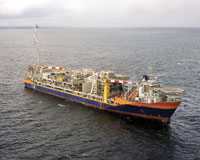International Politics
Can Norwegian and British activity be sustained? So far, high oil prices have strengthened the bargaining position of North Sea governmental landowners versus the oil and gas industry. Politically, the UK Treasury Department and Norway’s Finance Ministry have got the upper hand. The practical outcome is a tax increase on UK E&P operations, and the deferral of hoped-for tax reductions in Norway. Exploration drilling is a good indicator of interest in an oil province. Measured by wells drilled, North Sea exploration declined markedly during the 1997-1999 period of low oil prices before rising again in 2000 and 2001. British exploratory wells fell from 98 in 1997 to 38 in 1999, but recovered to 60 in 2001. In Norway, the number fell from 50 in 1997 to 22 in 1999, but jumped back to 34 in 2001. Even if the North Sea is a maturing province – measured by frequency and size of new finds, with UK waters maturing faster than in Norway – it still has good potential. New technology development and more efficient business practices have led to a persistently falling cost per barrel. This has permitted industry to move into deeper waters, and to develop smaller finds. New subsea technology development strengthens this trend, enhancing regional potential. Governments must follow up with fiscal and regulatory conditions that provide the right incentives. North Sea oil output hit an all-time high in 2000, exceeding 6 million bpd, but it declined slightly in 2001. It should increase again this year, with new fields’ output offsetting declines in mature reservoirs, depending on Norwegian cooperation with OPEC. Declining mature field output should outweigh gains from newer, smaller fields from 2003 onward, indicating long-term declines in North Sea productivity. Low oil prices and/or extreme price volatility negatively affect regional spending, due to relatively high production costs, and Norway’s high taxes. North Sea investment has declined since 1997’s peak. Higher prices in 2000 and 2001 have not reversed this trend. Unless investment increases, and E&P projects are stepped up, chances are that the reserve base will not be renewed. Output will gradually decline, with negative effects on government revenues and Western Europe’s oil-and-gas self-sufficiency. The case for reform is compelling after unsuccessful exploration efforts in first-half 2002. This summer’s Norwegian white paper recognizes that reality. The government said it would foster further upstream development, by ensuring that Norwegian waters remain attractive and offering firms a steady flow of prospective exploration areas. The intention is to modify licensing, to draw a greater distinction between mature and immature areas, both in concessionary duration and work obligations. Officials want a more efficient, license allocation system in mature areas, along with stricter work programs.
Taxation remains a problem. In principle, Norwegian petroleum taxation aims to capture economic rent from large oil fields, based on net income at a 78% rate, with six-year depreciation. The lack of a reasonable limitation means that new field development costs can be offset against current revenues. Thus, the tax system favors incumbent companies and capital-rich newcomers that buy into producing assets over smaller, capital-poor firms with marginal prospects. Cutting the depreciation schedule from six years to three or one would improve small-field development and newcomers’ opportunities. Current prices may justify present taxation levels, but officials should be ready to lower the special tax rate when oil prices slump again; this issue could be critical soon. The threshold for developing Norwegian assets is four to five times higher than in the UK. Lifting entry barriers would lower the threshold. In the early 1990s, low oil prices and mature resources caused a major overhaul of UK licensing and taxation systems. Royalty and the Petroleum Revenue Tax are not applied to new fields, so effective tax rate depends on field ages. Corporate income tax has been 30%, one of the world’s lowest rates. However, regulations limit profits from upstream activities. They cannot be modified for income tax purposes by any losses or relief arising from other work, including downstream projects, and certain E&P costs and losses. Nevertheless, UK oil output has been rising, at least temporarily, as smaller oil fields go onstream. New fiscal conditions have provided incentives, and new licensing procedures enhance industry flexibility. However, British fiscal limits are an obstacle to oil-company financing of new projects from revenues, and they deter investment. Therefore, lifting fiscal limits may be necessary to sustain activity in an increasingly mature province. Surprisingly, UK officials this past spring moved in the opposite direction, adding a 10% surcharge to the corporate tax on E&P profits. Suddenly, British taxation is less favorable, especially when regulatory limitations are considered. The tax rise reduces the value of British assets to the industry, compromising UK competitiveness, and investors’ ability and willingness to take risk. The announced abolition of remaining royalties is unlikely to modify this picture noticeably. Thus, the outlook may be for reduced E&P work in UK waters, compared to earlier activity levels. Øystein Noreng is Professor, Norwegian School of Management, and he holds the TotalFinaElf chair in petroleum economics and management. He is a regular contributor to this column. |
- Mixed outlook for activity on the UK Continental Shelf (December 2023)
- First Oil: Sorting through the muddled mess (November 2022)
- First Oil: Electricity problems reflect poor energy/resource policy (August 2022)
- First Oil: A tale of two “windfalls” (June 2022)
- The ESG perspective: A day without oil? (April 2022)
- Executive viewpoint: Texas oil and gas can save Europe—again (April 2022)
- Applying ultra-deep LWD resistivity technology successfully in a SAGD operation (May 2019)
- Adoption of wireless intelligent completions advances (May 2019)
- Majors double down as takeaway crunch eases (April 2019)
- What’s new in well logging and formation evaluation (April 2019)
- Qualification of a 20,000-psi subsea BOP: A collaborative approach (February 2019)
- ConocoPhillips’ Greg Leveille sees rapid trajectory of technical advancement continuing (February 2019)





